For a real winter warmer, try my Harissa Aubergines on Red Pepper Freekeh. It's packed full of flavour and makes a filling meal. Find out about the ingredients you need to make this delicious dish and get the recipe below.
A heartwarming dinner
As the nights draw in and the temperature drops, I start looking for delicious dinner recipes that will leave me full and feeling warm. Soups and stews are classic winter warmers but today I'm sharing something a little bit different. My Harissa Aubergines on Red Pepper Freekeh is warming thanks to the vibrant chilli paste and is filling due to the ancient grains.
Both harissa and freekeh are frequently used in North African cuisine. I've used them as the basis of this plant based dinner. The freekeh is cooked with caramelised onions and red pepper paste for a rich, saucy base. I then roast baby aubergines with harissa until they are soft, sweet and spicy. To finish the dish I drizzle over a little coconut yogurt and top with fresh coriander leaves.
It's rich and hearty making it the perfect dinner in the colder months.
What is harissa?
Harissa is a spicy chilli pepper paste that originates from Tunisia. Other ingredients in this rich paste include roasted red peppers and a mixture of spices and herbs such as garlic, caraway seeds, coriander seeds and cumin. The peppers, herbs and spices are ground together and mixed with olive oil to turn it into a versatile spice paste.
Store bought harissa can vary wildly in flavour and heat. Some might be more mild and floral (perhaps flavoured with rose water), others will be packed full of chillies and have a really aggressive level of heat! Always taste your harissa before you add it to a dish and adjust the amount you use based on your own preferences.
I love using harissa. I'ts commonly used as a dip or marinade, or to add to dishes like stews. You can find more recipes made with harissa at the end of this post.
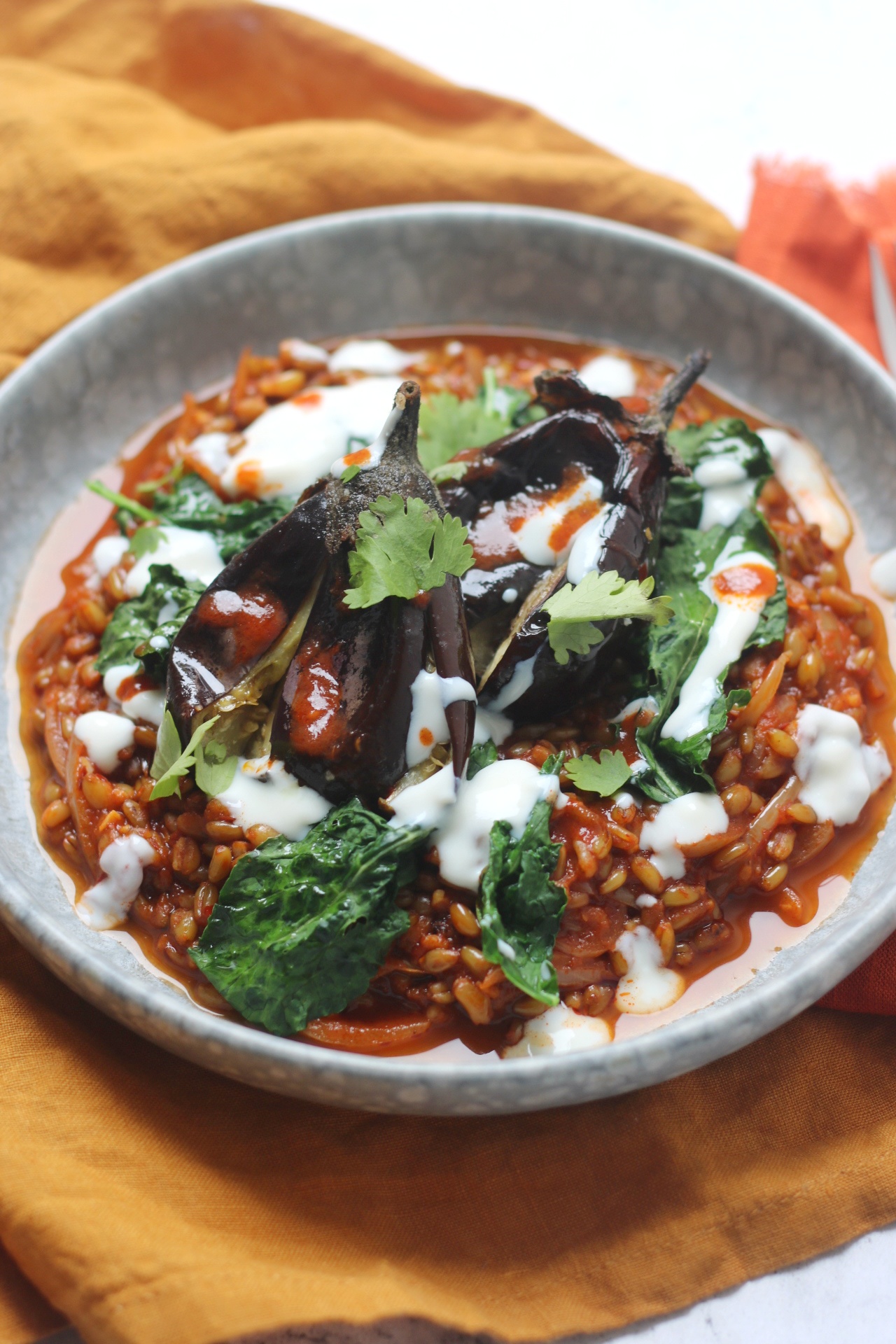
What is freekeh?
Freekeh (or farik) is made from green durum wheat that is roasted and rubbed to create its flavour. (In fact the Arabic-derived word "freekeh" means "to rub."
Because it is a whole grain which means that it is similar to bulgur wheat, farro, spelt, and even wheat berries. Each of which can be used in place of the freekeh if you're unable to source it in your local supermarket.
But, as "ancient grains" have grown in popularity in recent years, freekeh is starting to regularly appear on supermarket shelves. It's also readily available in health food stores and of course online!
Cooking freekeh is quite simillar to cooking giant cous cous (which is also made from durum wheat). If you have bought the wholegrain it will take about 45 to 50 minutes to cook. All you need to do is bring a pan of water or stock to the boil, reduce the heat and let the freekeh simmer until it is tender. If you have purchased cracked freekeh it will take roughly half the time to cook.
It's also possibly to buy ready cooked freekeh which you just re-heat. This is a fantastic shortcut if you want to make this dish but are short on time.
Red pepper paste, coconut yogurt and more...
Hopefully the rest of the ingredients in this recipe aren't too unusual. Although I've used baby aubergines you could use regular aubergines but cut them into smaller chunks to reduce the cooking time.
I've used a coconut based yogurt that is quite mild in flavour. You do have to be careful to avoid sweet yogurt when purchasing plant based varieties. Choose one that describes itself as unsweetened or that is trying to mimic Greek or natural yogurt. If you do eat dairy then a natural or Greek yogurt would work perfectly!
The only other ingredient you might need to buy especially is mild red pepper paste. This is common in Turkish cuisine and is fantastic stirred into bulgur wheat or saucy dishes like shakshuka and other stews.
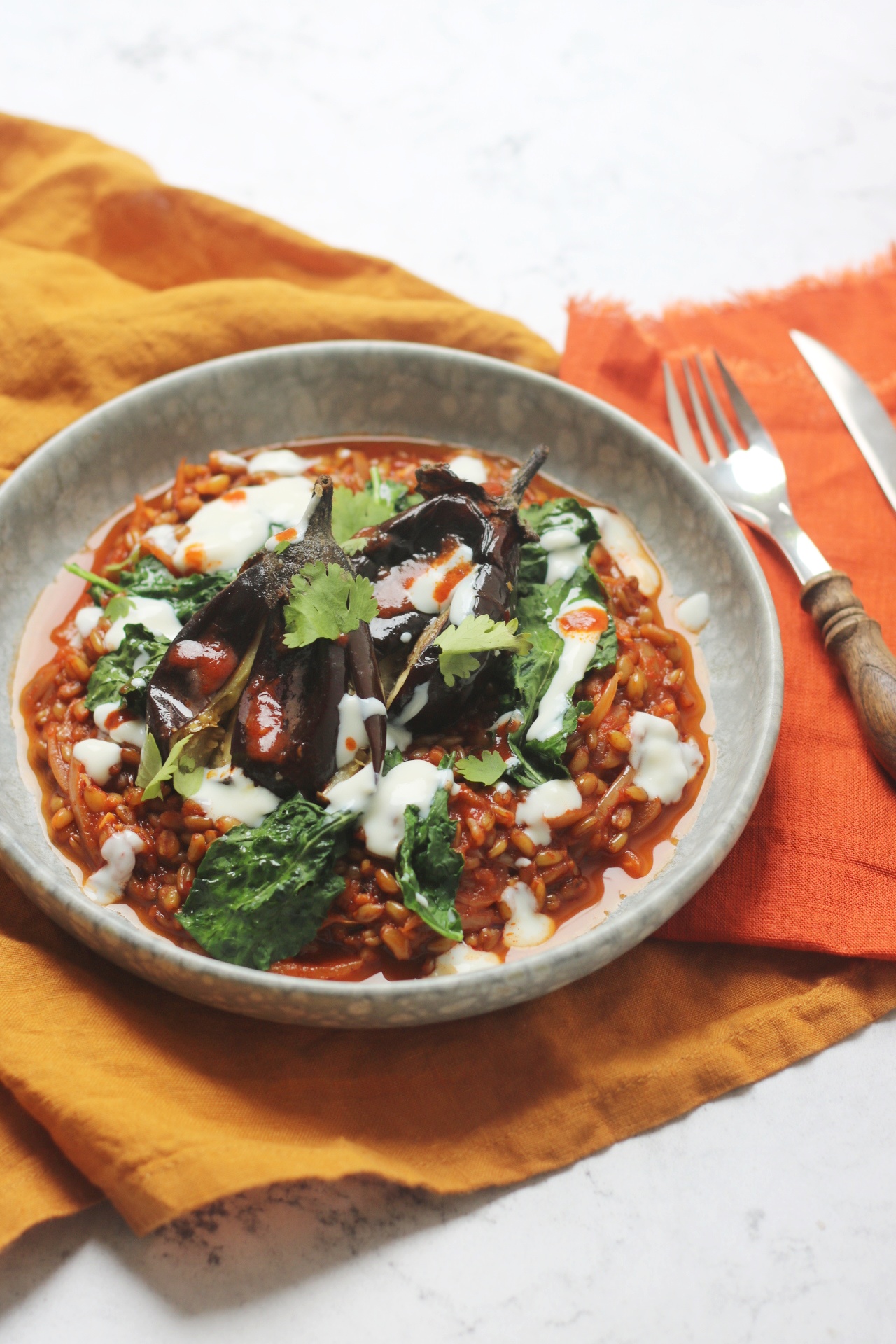
The recipe
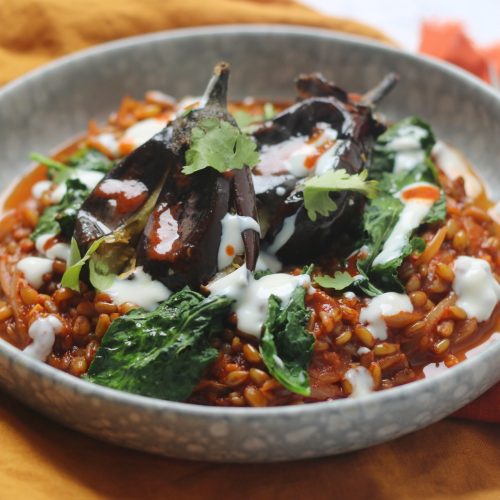
Harissa Aubergines on Red Pepper Freekeh
Ingredients
For the harissa aubergines
- 1 tablespoon olive oil
- 300 grams aubergines
- 4 tablespoon harissa taste and adjust quantities according to your heat preference
For the red pepper freekeh
- 1 small white onion thinly sliced
- 0.5 teaspoon salt
- 2 cloves garlic minced
- 100 grams freekeh
- 300 ml vegetable stock
- 100 grams cavolo nero
- 4 tablespoon red pepper paste
For the yogurt
- 6 tablespoon coconut yogurt or other, unsweetend plant based yogurt
- 0.5 lemon juice only
- 1 clove garlic minced
For garnish
- coriander fresh, leaves only
Instructions
To make the harissa roasted aubergines
- Pre-heat you oven to 190C / 335F / gas mark 5.
- If using baby aubergines, cut them length-ways from the base to where the stem begins. Don't cut through the stem, this will ensure they stay whole. Rotate the baby aubergine 90 degrees and cut length-ways again so that you have a cross running through it's flesh. Spoon the harissa paste into the cross so that the flesh soaks up all of the spice. Brush the outside of the aubergine with oil.If using large aubergines, cut into 8 pieces and then toss them in the olive oil and harissa paste.
- Place the aubergine on to a baking tray and cook in the centre of the oven for 45 minutes or until soft.
To make the freekeh
- Add the olive oil, thinly sliced onions and salt into a heavy bottom sauce pan and sauté on medium heat, stirring occasionally, for 15–20 minutes. or until the onion is soft and sticky.
- Add the garlic to the pan and cook for a few more minutes on low.
- In the meantime, soak the freekeh in cold water for 5 minutes, then drain and rinse it well before adding it to the onions and garlic along with the vegetable stock.
- Stir well then turn up the heat slightly to bring it to the boil. Cover, reduce the heat and then leave to simmer for 30 minutes.
- Once the freekeh is tender, stir through the red pepper paste and the cavolo nero take it off of the heat, but leave it covered. The residual heat will wilt the cavolo nero.
To serve
- While the freekeh is resting and the aubergines are finishing roasting, mix the yogurt, lemon and garlic together.
- Spoon the red pepper freekeh onto your plates. Top with the harissa aubergines then drizzle with the lemon yogurt. Finally garnish with the fresh coriander.
Nutrition
If you like this recipe you'll love...
More seasonal recipes
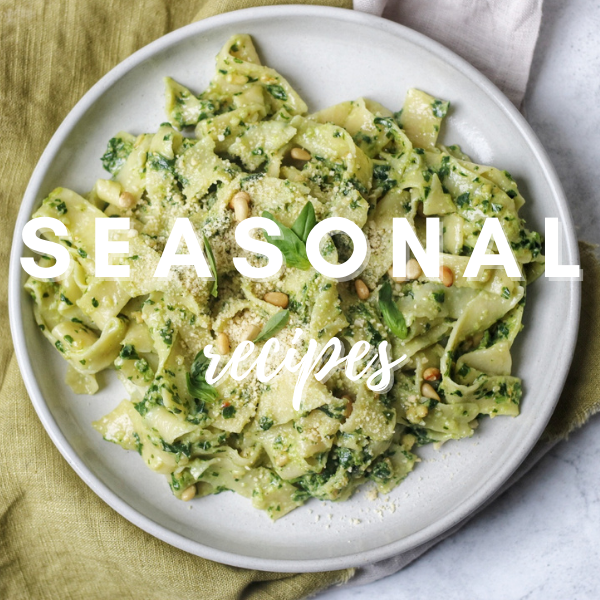
For more meal ideas that will keep you warm through autumn and winter, check out the seasonal recipe archive.

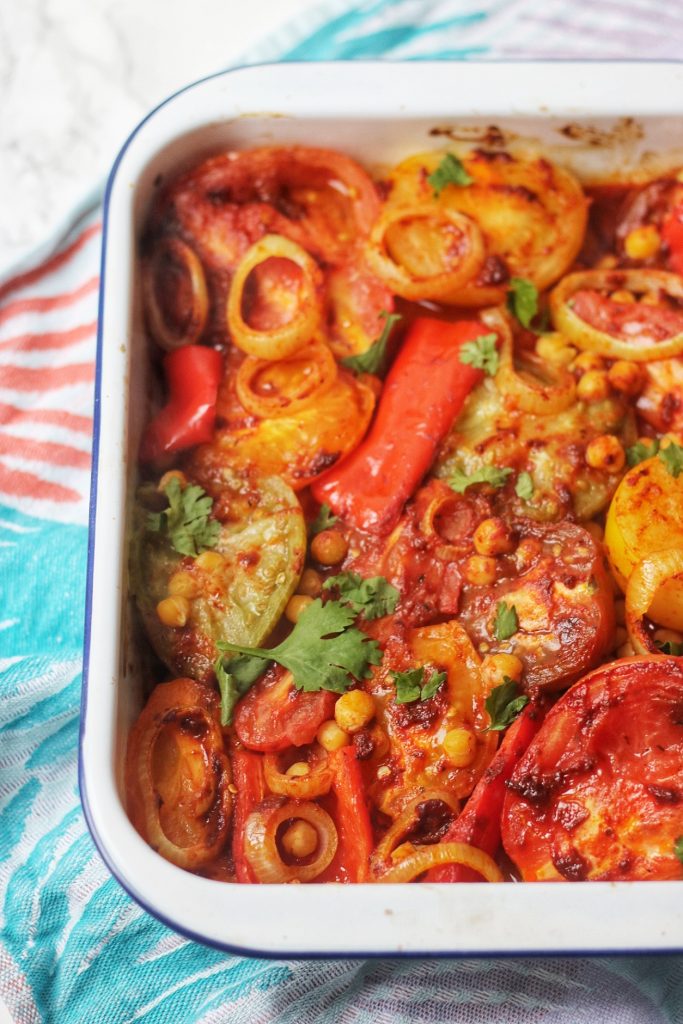
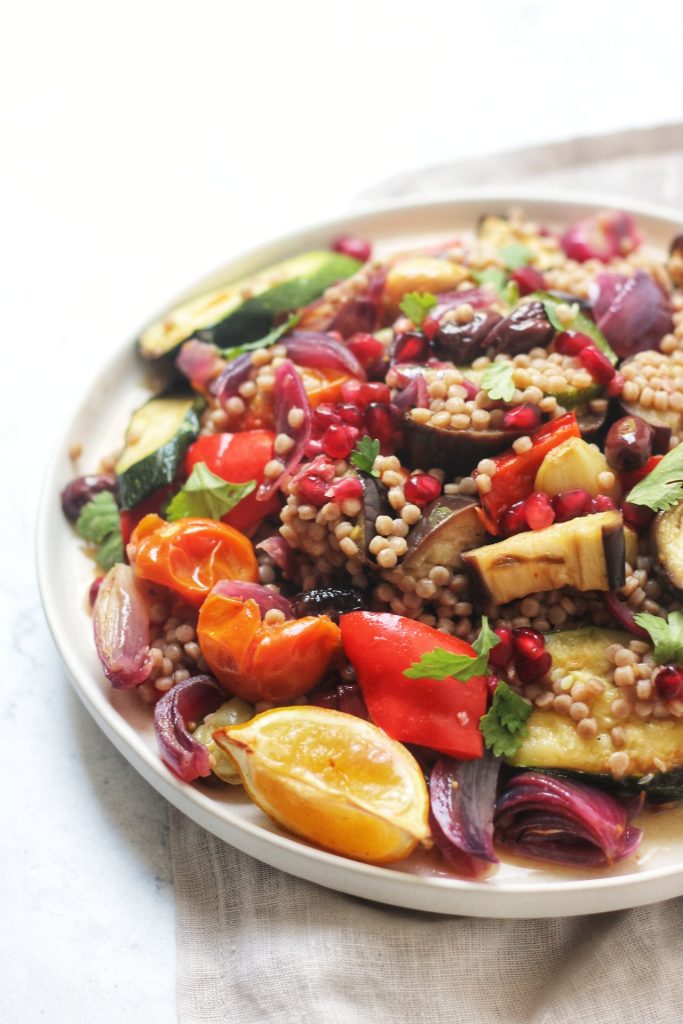
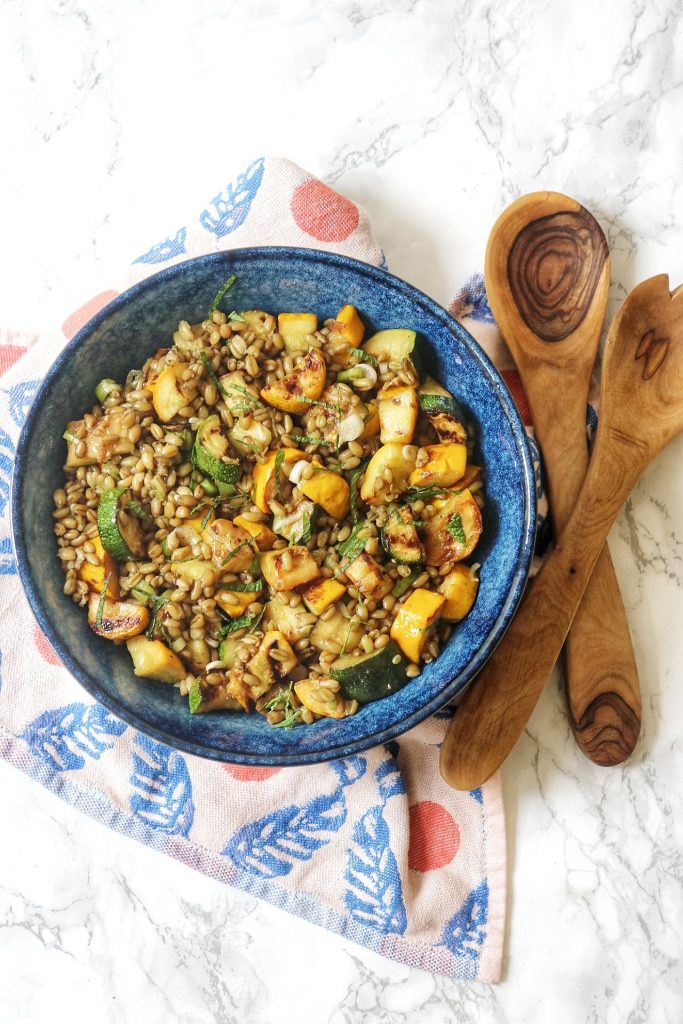
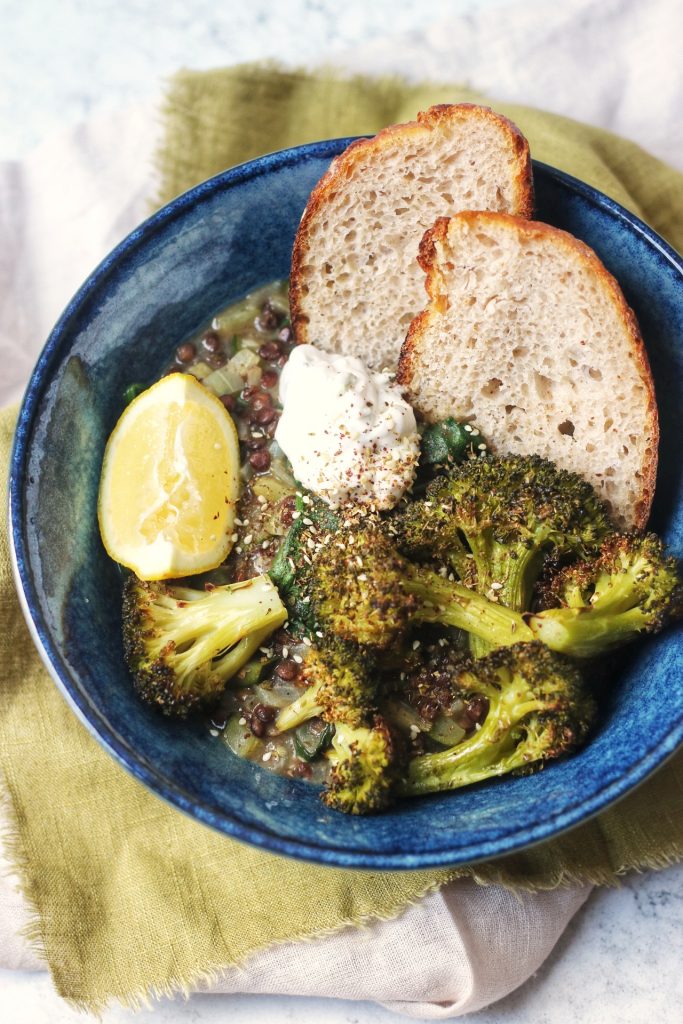
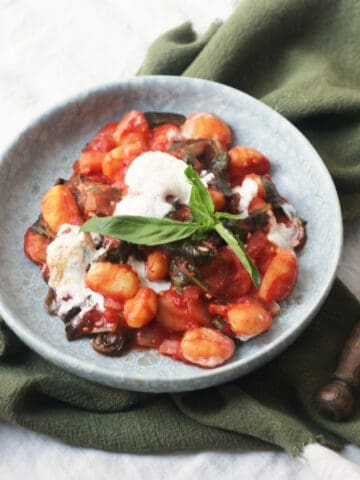
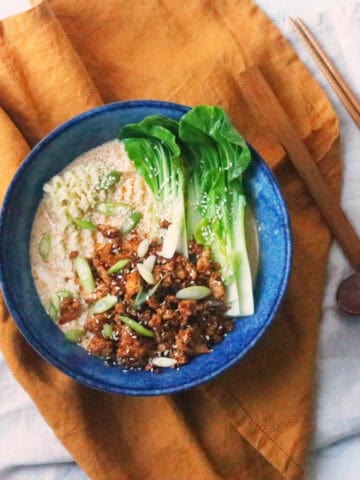
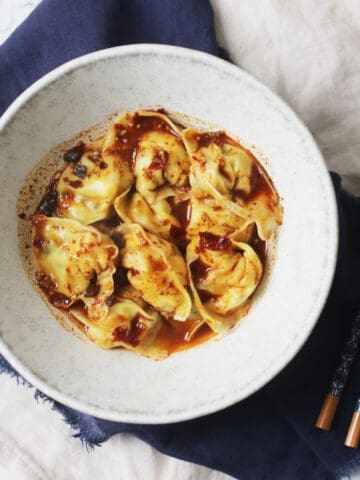
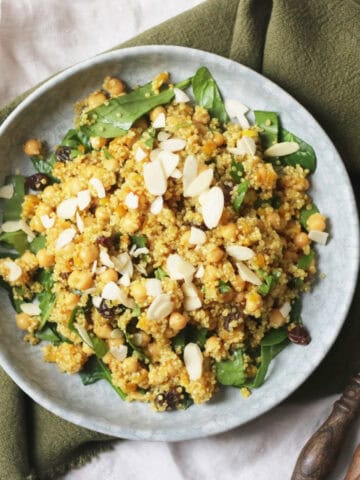
Leave a Reply